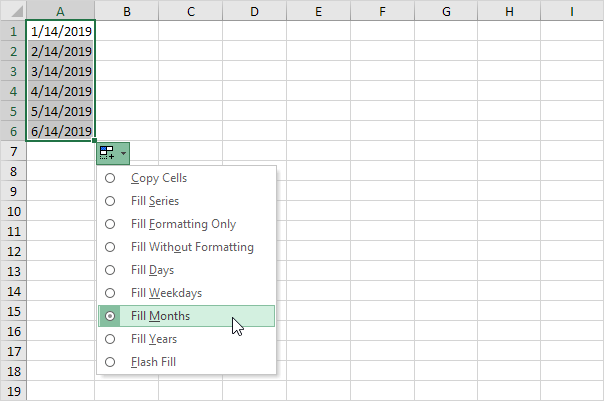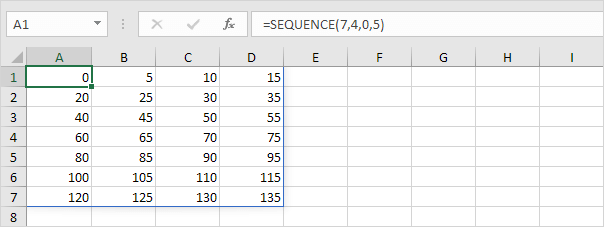AutoFill in Excel
Use AutoFill in Excel to automatically fill a series of cells. This page contains many easy to follow AutoFill examples. The sky is the limit!
1. For example, enter the value 10 into cell A1 and the value 20 into cell A2.

2. Select cell A1 and cell A2 and drag the fill handle down. The fill handle is the little green box at the lower right of a selected cell or selected range of cells.

Note: AutoFill automatically fills in the numbers based on the pattern of the first two numbers.
3. Enter Jan into cell A1.

4. Select cell A1 and drag the fill handle down. AutoFill automatically fills in the month names.

5. Enter Product 1 into cell A1.

6. Select cell A1 and drag the fill handle down. AutoFill automatically fills in the product names.

7. Enter Friday into cell A1.

8. Select cell A1 and drag the fill handle down. AutoFill automatically fills in the day names.

9. Enter the date 1/14/2025 into cell A1.

10. Select cell A1 and drag the fill handle down. AutoFill automatically fills in the days.

11. Instead of filling in days, use the AutoFill options to fill in weekdays (ignoring weekend days), months (see example below) or years.

Note: also see the options to fill the formatting only and to fill a series without formatting.
12. Enter the date 1/14/2025 into cell A1 and the date 1/21/2025 into cell A2.

13. Select cell A1 and cell A2 and drag the fill handle down. AutoFill automatically fills in the dates based on the pattern of the first two dates.

14. Enter the time 6:00 AM into cell A1.

15. Select cell A1 and drag the fill handle across. AutoFill automatically fills in the times.

16. When Excel doesn't recognize a list, simply create a custom list.


17. Learn how to use Flash Fill to automatically extract data, combine data, and much more.


If you have Excel 365 or Excel 2021, you can also use the SEQUENCE function to fill a series of cells. This function is pretty cool.
18. The SEQUENCE function below generates a two-dimensional array. Rows = 7, Columns = 4, Start = 0, Step = 5.

19. The SEQUENCE function below generates a list of odd numbers. Rows = 10, Columns = 1, Start = 1, Step = 2.

Note: the SEQUENCE function, entered into cell A1, fills multiple cells. Wow! This behavior in Excel 365/2021 is called spilling.